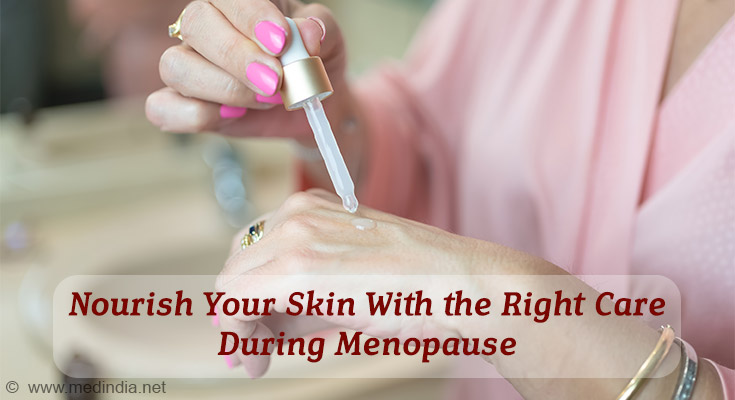Menopause affects your skin more than you think—here’s how to care for it.
- Declining hormones during menopause impact skin structure and hydration
- Menopausal skin needs extra protection with sunscreen, moisturizers, and collagen boosters
- Good sleep and a healthy diet can significantly improve skin repair and vitality
What happens to your skin during menopause?
Go to source).
Menopause can speed up skin aging due to collagen loss! #skinhealth #menopausecare #medindia’
What Happens to Your Skin During Menopause?
The Role of Hormones
Menopause signals a major drop in reproductive hormones like estrogen and progesterone. These hormones aren’t just important for fertility — they’re key to keeping skin firm, hydrated, and youthful. Without them, the skin can become dry, thin, sensitive, and more prone to wrinkles.
Dermatologists note that skin often changes before periods stop completely, during the perimenopause phase. If your skin feels different lately, menopause could be the silent cause.
Early Signs to Watch For
- Dryness and itching
- Thinner, more fragile skin
- Fine lines and wrinkles
- Increased facial hair
- Rough, crepe-like texture
Essential Skin Care Tips for Menopausal Skin
Hydrate, Hydrate, Hydrate
Moisture loss is one of the most noticeable effects of menopause on your skin. Boost hydration from the inside out by drinking plenty of water and adding healthy fats to your diet — think avocados, nuts, olive oil, and fatty fish.
Topically, look for moisturizers with hyaluronic acid, ceramides, and glycerin to help lock in moisture.
Protect Your Skin Daily
Sun sensitivity increases after menopause. Daily use of a broad-spectrum sunscreen with SPF 30 or higher is non-negotiable. Sunscreen helps prevent hyperpigmentation, rough texture, and further collagen breakdown.
Revitalize with Targeted Ingredients
Ingredients like retinoids, vitamin C, and growth factors can boost collagen production, improve skin texture, and restore your natural glow. Introduce these products slowly to avoid irritation, and don’t forget to pair them with a nourishing moisturizer.

Consider Bioidentical Hormone Therapy
For some women, bioidentical hormone replacement therapy (BHRT) can help replenish declining hormones and improve skin health. Always discuss potential risks and benefits with your healthcare provider before starting.
Common Skin Conditions Linked to Menopause
Menopausal Acne
Yes, breakouts can return! Androgens (male hormones) may rise relatively higher during menopause, leading to jawline and chin acne. Use gentle cleansers and non-comedogenic products, and talk to your dermatologist about treatments like topical retinoids.
Hyperpigmentation and Age Spots
Hormonal changes plus years of sun exposure can cause dark spots. Brightening ingredients like vitamin C and niacinamide and procedures like chemical peels can help even out skin tone.
When to See a Dermatologist
If you notice sudden, severe, or unusual changes in your skin, consulting a dermatologist is essential. They can help you design a personalized plan — from prescription treatments to advice on skincare products — to address your unique needs.Embracing the Change
Menopause marks a beautiful transition — not just a physical one, but a new phase of empowerment and self-love. Although your skin may need a little more attention, these changes are completely natural.By nurturing your body with hydration, sun protection, smart skincare, and perhaps some medical guidance, you can continue to glow confidently through every season of life.
After all, beauty isn’t about reversing time — it’s about embracing every chapter with grace and vitality.
Reference:
- What happens to your skin during menopause? - (https://www.nbcnews.com/select/shopping/menopause-skin-care-rcna198880)
Source-Medindia
















